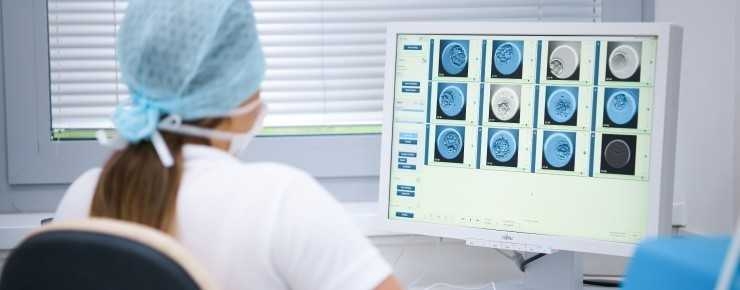Assisted reproduction and genetic diagnostics have advanced so much in the most recent two decades that a large number of genetic diseases can be diagnosed in an embryo before it is actually transferred to the uterus. Nowadays, the testing is always performed identically – on the fifth day after egg fertilization, when the embryo is at the stage of the so-called expanded blastocyst. The embryologist collects several cells from the future fetal envelopes of the embryo (trophoblast) and sends them for genetic assessment. Immediately after collecting these cells, the embryo is frozen (cryopreserved) and stored in liquid nitrogen, awaiting the results of genetic testing.
Nowadays, genetic testing of embryos involves state-of-the-art laboratory procedures. Most tests are performed using the next generation sequencing (NGS) method, while some rare diseases are diagnosed by karyomapping. Previously used fluorescent in-situ hybridization (FISH) and comparative genomic hybridization (array-CGH) are no longer applied today. The advantage of NGS is that it can also detect the so-called embryo mosaicism (embryos in which there are several cell lines with different genotypes).
Genetic testing of embryos can be divided into three different categories, depending on the genetic disorders to be detected in the embryo:
- assessment of the number of chromosomes of the embryo
(PGT-A or preimplantation genetic testing of aneuploidies), - testing for hereditary diseases that have been confirmed in the parents or their relatives
(PGT-M preimplantation genetic testing of monogenic diseases), - assessment of chromosomal structural rearrangements
(PGT-SR preimplantation genetic testing of structural chromosomal abnormalities – to rule out unbalanced chromosomal rearrangement if a balanced structural chromosomal rearrangement was detected in either of the parents).
It is always advisable to consult both a reproductive specialist and a medical geneticist about any genetic testing. The success rate of embryo transfers of genetically tested embryos is significantly higher than that of non-genetically tested embryos. However, it should be noted that this is a diagnostic method, not a treatment.
Genetic testing of embryos can increase the success of embryo transfer, but not the IVF cycle as such. Still, the patient couple will avoid unnecessary transfer, which has a very significant psychological effect, especially during a long-term and unsuccessful treatment. On the other hand, genetic testing of embryos is not always necessary in couples at a young age, with a known cause of infertility and optimal embryonic development. This is yet another reason why it’s necessary to deal with each patient on a strictly individual basis.
- Samoplatca
| Názov | Suma na úhradu | |
|---|---|---|
| Embryo biopsy | Suma na úhradu 400 € 400 € 400 € 400 € | |
| PGT-SR screening of structural changes of chromosomes (simultaneous aneuploidy screening) with NGS method - 1 embryo | Suma na úhradu 350 € 350 € 350 € 350 € | |
| PGT-A aneuploidy (24 chromosomes) using the NGS method - 1 embryo | Suma na úhradu 350 € 350 € 350 € 350 € | |
| PGT-M screening of monogenic diseases by karyomapping method - screening of reference samples + preparation | Suma na úhradu 1650 € 1650 € 1650 € 1650 € | |
| PGD-M screening of monogenic diseases by karyomapping method - each embryo | Suma na úhradu 400 € 400 € 400 € 400 € | |
| PGT-M screening of selected monogenic disorders by using the OneGenePGT method - screening of reference samples + preparation | Suma na úhradu 1200 € 1200 € 1200 € 1200 € | |
| PGT-M screening of selected monogenic diseases by using the OneGenePGT method - each embryo | Suma na úhradu 350 € 350 € 350 € 350 € | |
| Direct detection of mutations in the embryo by karyomappping | Suma na úhradu 600 € 600 € 600 € 600 € | |
| Union health insurance company provides a contribution of EUR 900 for preimplantation genetic diagnostic services (PGD) where the diagnosis has been indicated by a specialist in genetics | ||
